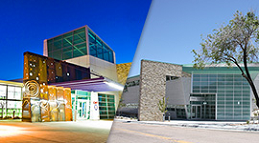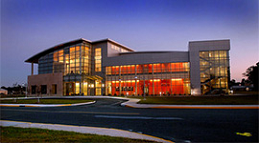|
Center for Integrated Nanotechnologies (CINT) at Sandia and Los Alamos National Laboratories |
The National Nanotechnology Initiative (NNI) helps all Americans to take advantage of the promise of nanotechnology. Educational networks create resources to teach the basics of nanoscale science and engineering. There are also workforce training programs to prepare people for jobs in nanotechnology-related fields. The NNI assists in research and development through nanoscale science and technology user facilities. These facilities supply specialized capabilities, equipment, and infrastructure that are designed to help researchers turn their ideas into products. Resources are generally available to both U.S.-based and international researchers. Individual facilities and their funding agencies determine access rules, costs, and provisions for proprietary research. |
The Center for Nanoscale Science and Technology (CNST), operated by the National Institute of Standards and Technology
The CNST helps move nanotechnology from the laboratory to the marketplace by providing rapid access to world-class nanoscale measurement and fabrication methods and technology. The CNST’s NanoFab supplies researchers with a commercial state-of-the-art tool set at economical hourly rates, along with help from a dedicated, full-time technical support staff. The NanoLab makes cutting-edge tools and processes available through collaboration with CNST’s multidisciplinary research staff members, who continually develop new measurement and fabrication methods in response to national nanotechnology needs. Industrial researchers working in the NanoFab range from entrepreneurs turning inventions into prototypes to major U.S. corporations reducing both the risk and the time needed to develop new technologies. The CNST is the only national nanoscale science and technology user facility and laboratory with a focus on aiding commerce.
National Nanotechnology Applications and Career Knowledge (NACK) Network, funded by the National Science Foundation’s Advanced Technological Education (ATE) program (2005-2015)
With an emphasis on two-year colleges, the ATE program focuses on educating technicians for the high-technology fields that drive our Nation's economy. The program involves partnerships between academic institutions and industry to improve the education of science and engineering technicians at the undergraduate and secondary school levels. With support from the ATE program, Pennsylvania State University developed NACK, a nationwide partnership of research universities and community colleges that is bringing meaningful core-skills nanotechnology workforce education to technical and community colleges across the United States. During its first four years, there were over 800 graduates from nanotechnology classes offered by the NACK hubs, 20,881 web downloads of NACK educational materials, and 957 educators who completed professional development workshops.
Nanoscale Informal Science Education Network (NISE Net), funded by the National Science Foundation (2005-2015)
As scientists and engineers work at the nanoscale to revolutionize everything from medicine to manufacturing, NSF recognizes the need for public engagement with this research. NISE Net excites young people about nanoscale science so they grow up wanting to be a part of it. It also creates partnerships between informal science education institutions and researchers working at the nanoscale. This network of 550 museums, universities, and other institutions (in 2014) is engaged in supporting, developing, and implementing informal educational experiences about nanoscale science, engineering, and technology all across the United States. A catalog of informal educational materials with 280 activities, programs, exhibits, media, tools, and guides is available for anyone interested in nanoscale science, engineering, and technology education. Its mini exhibitions have reached 9 million people annually. NISE Net also created NanoDays, an annual festival of nanotechnology educational experiences for the public that are supported by a kit of educational materials distributed annually to 250 sites nationwide reaching 3 million children annually.
National Nanotechnology Infrastructure Network (NNIN), funded by the National Science Foundation (2004-2015)
The NNIN is an integrated, networked partnership of user facilities serving the resource needs of the nanoscale science, engineering, and technology communities. The NNIN provides users across the Nation in academia, small and large companies, and government with open access, both on-site and remotely, to leading-edge tools, instrumentation, and capabilities. The network’s facilities support fabrication, synthesis, characterization, design, simulation, and integration, to help enable individual nanoscience research projects. The NNIN also has extensive education, training, and outreach activities, as well as activities related to potential social and ethical issues associated with nanotechnology. The NNIN is expected to be replaced in September 2015 by a new NSF-funded user facility network, the National Nanotechnology Coordinated Infrastructure (NNCI).
National Nanomanufacturing Network (NNN), supported by the National Science Foundation (2005-2016)
The NNN works toward a more effective translation of laboratory science to applications, while at the same time building a strong and sustainable physical and intellectual toolbox. It operates as an open-access network of centers, leaders, and experts from the nanomanufacturing research, development, and education community. The NNN serves as a catalyst to advance nanomanufacturing by facilitating roadmapping, collaboration, and strategic activities in enabling areas of nanomanufacturing, and by sharing information through InterNano, the NNN’s nanomanufacturing database and information resource.
Nanotechnology Undergraduate Education (NUE) in Engineering Program at the National Science Foundation (2003-2014). This program introduced nanoscale science, engineering, and technology into undergraduate engineering education through a variety of interdisciplinary approaches. The 2014 NUE focus was on nanoscale engineering education with relevance to devices and systems and/or on societal, ethical, economic, and/or environmental issues relevant to nanotechnology.
|
Nanoscale Science Research Centers (NSRC), operated by the U.S. Department of Energy
The five NSRCs are scientific user facilities that provide access to state-of-the-art nanotechnology instrumentation and fabrication capabilities. They have the dual missions of enabling the scientific community to carry out high-impact nanoscience projects through an open, peer-reviewed user program and to conduct in-house research to discover, understand, and exploit functional nanomaterials for society’s benefit. These centers focus on the synthesis, characterization, fabrication, and theory of nanostructures; the integration of nanomaterials into the micro/macro scale; advancing and exploiting nanoscale materials and
|
Center for Functional Nanomaterials (CFN) at Brookhaven National Laboratory |
phenomena to address the Nation’s energy challenges; understanding and controlling electronic, ionic, and molecular behavior at the nanoscale; and basic research on and development of advanced instrumentation.




